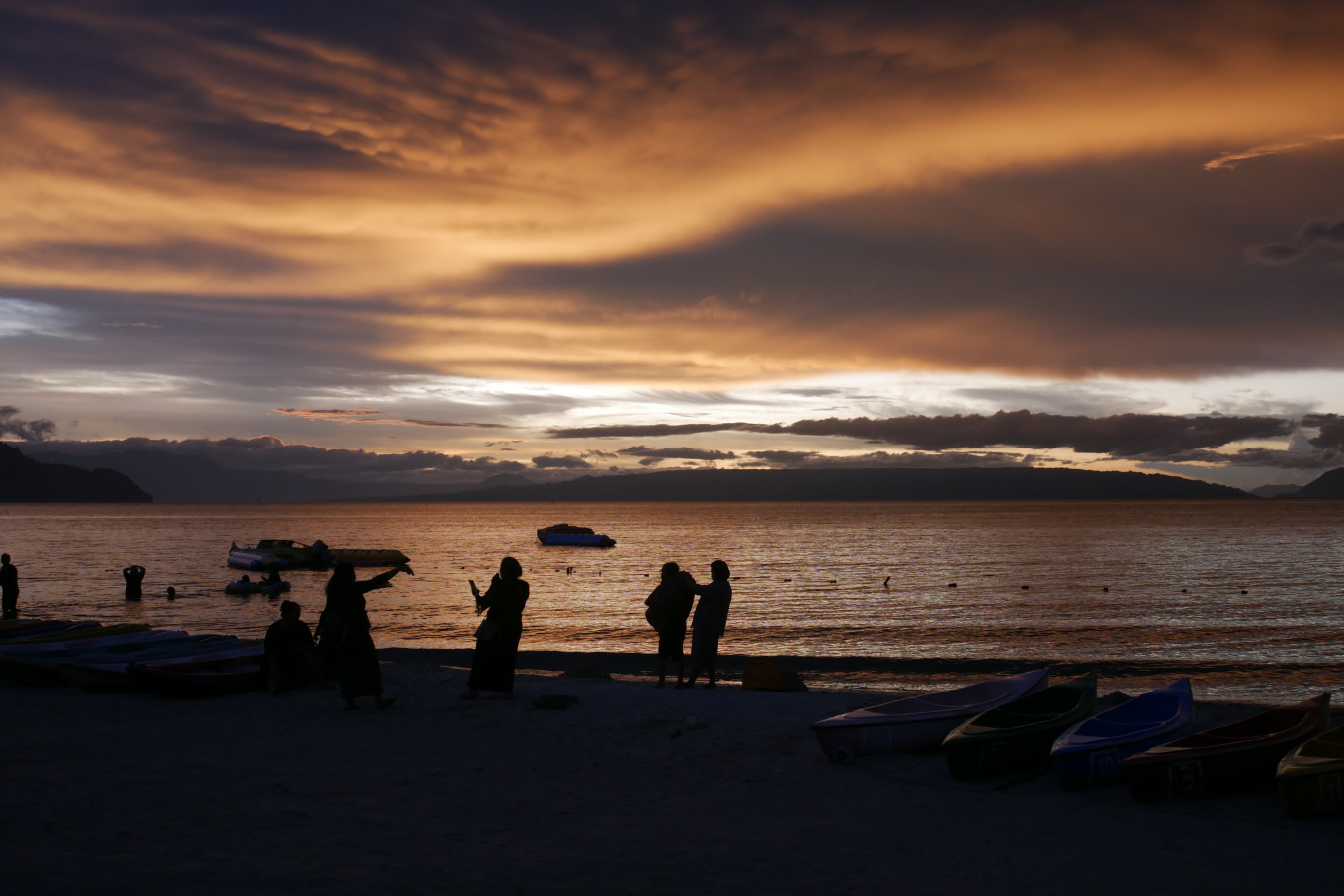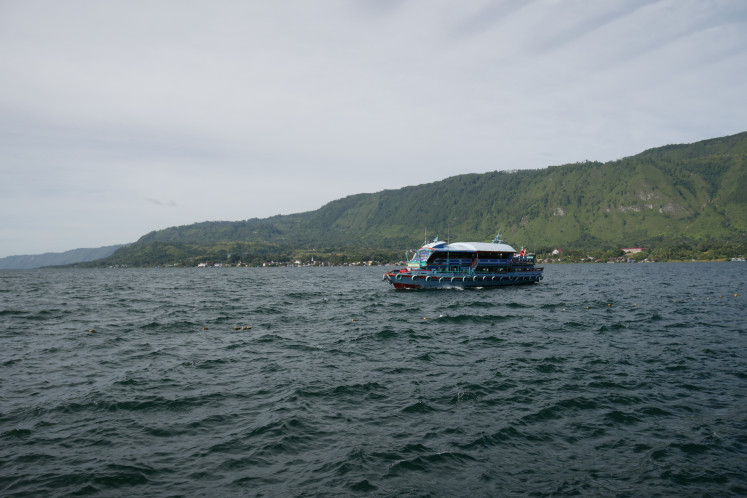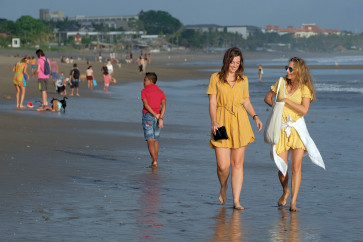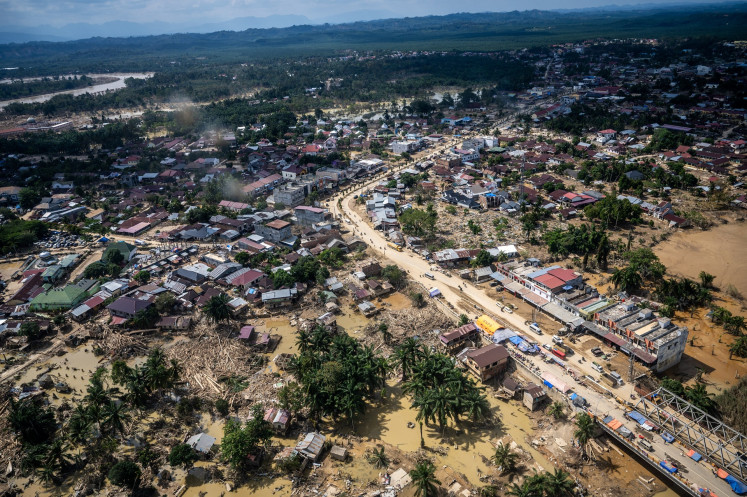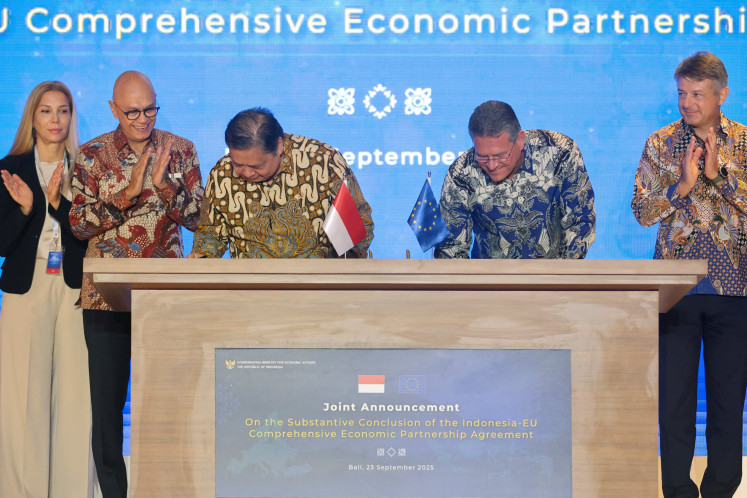Popular Reads
Top Results
Can't find what you're looking for?
View all search resultsPopular Reads
Top Results
Can't find what you're looking for?
View all search resultsGradual reawakening: Lake Toba tourism starts picking up again
Change text size
Gift Premium Articles
to Anyone
Even as domestic travel resumes, tourism businesses at the famous lake are yet to see the return of foreign visitors.
It was early June when Saragi was busy clearing leaves that had drifted to shore near the hotel where he works at Lake Toba in Tuktuk Siadong, Samosir, North Sumatra.
The hotel seemed crowded with families that day, and the lifeguard did not want them to feel inconvenienced by debris and trash on the lakeshore.
"[I hope] that guests with children can swim in comfort," said Saragi, who is in his 50s, adding that he always made sure that the hotel guests wore life jackets when swimming in the lake.
Saragi has worked at the hotel for more than 10 years and has been back full-time for just a few months, two years since the pandemic hit the Lake Toba tourism industry. He said he had to look for additional work during those two years, as the hotel was only able to pay him and his colleagues half their wages.
He can now start smiling with hope, as COVID-19 cases have gradually receded and the government has started to allow hotels and restaurants to operate again. He and dozens of other hotel workers are again busy as tourist activities begin to recover.
"Now, [Lake Toba] is getting busy again. Guests keep coming and the hotel rooms are occupied again," he said.
Crossing the lake: A ferry sails on Lake Toba, transporting tourists to hotels in Tuktuk, Samosir. Hotels in the area welcome the arrival of local tourists and expect for more foreign visitors. (JP/Tonggo Simangunsong) (JP/Tonggo Simangunsong )No foreign tourists
Lake Toba is one of the country’s many tourist destinations that were affected during the pandemic. According to a February 2022 statement from Statistics Indonesia (BPS), zero foreign tourists visited North Sumatra in December 2021.
The domestic tourist industry started to show signs of life after COVID-19 numbers declined.
A number of tourist destinations, including Lake Toba, have started to welcome visitors to local attractions and lodgings. Lake Toba has become filled with domestic tourists during certain periods, such as national and school holidays.
The number of foreign tourists still remains low, however.
In its June report, BPS recorded 494 foreign visitors to North Sumatra in April, followed by a significant rise to slightly over 3,000 foreign tourists in May.
Local hoteliers have also noted the low number of foreign guests, including Toledo Inn owner Cyccu Tobing, who confirmed that domestic tourists from regencies and provinces outside of North Sumatra dominated the local tourist scene. According to her, most were families who preferred to spend their holiday at Lake Toba rather than in their hometowns.
"Since tourism began to return to normal in November last year, tourist visits have started to stabilize, but we can say that 100 percent of Toledo Inn’s visitors today are domestic tourists, [with] only one or two foreign tourists," said Cyccu.
The return of domestic tourists is indeed good news. But Cyccu also wanted foreign tourists to return, because they were very good for her business.
"Of course in terms of income, foreign tourists bring in more income than domestic tourists because their needs are certainly higher. Hotels can sell more drinks, such as beer [and] wine, and a greater variety of food,” she said.
Cyccu added that before the pandemic, Toledo Inn, which was established 35 years ago, regularly hosted guests from Europe via several travel and tour operators based in Medan, the provincial capital. But even though the country was gradually emerging from the pandemic, the area had seen no foreign tourists yet.
Global issues
Lake Toba was suffering a dearth of foreign visitors due to a number of factors, including the uncertain economic and political conditions in Europe. Skyrocketing world oil prices as an impact of the Russia-Ukraine war had also increased the price of international flights.
"We certainly can't expect many foreign tourist arrivals if the situation abroad is not yet stable," said Indra S. Fadjar, the manager of Horas Travel, which used to regularly take tourist groups from Europe to Lake Toba.
According to Indra, another factor was the lingering anti-vaccine attitude in several countries. For example, one family of four had planned to travel to Lake Toba, but the vaccine status for one member of the family was unclear, so it was also unclear if the family could travel.
“The family said there was a child who didn't want to be vaccinated. If the child doesn't want to be vaccinated, chances are [the whole family] will not come,” he said.
Willy Sihombing, a tour operator at Sedona Holidays who used to serve tourists from Malaysia and Singapore, acknowledged that air ticket prices had increased almost 90 percent. This had prompted some tourist groups to postpone their visits.
Current prices for Medan-Singapore flights, for instance, reached US$167 one way, from $100 previously.
"With the current conditions, we can only wait and see, hoping and waiting for ticket prices to fall," said Willy, who is also the North Sumatra advisor of the Association of Air Ticketing Companies in Indonesia (Astindo).
Meanwhile, according to Solahuddin Nasution, the North Sumatra chairman of the Association of Indonesian Tour and Travel Agencies (ASITA), domestic and international flights are much more expensive than they were before the pandemic. This has greatly affected the rate of tourist visits.
The frequency of flights also remains low. For example, Garuda Indonesia used to fly the Medan-Jakarta route dozens of times each day, but the figure has now fallen to just two to three times per day. The flight frequency of other domestic airliners, such as Lion Air, Batik Air and Citilink, is also still low.
“So, the effort to revive [tourist] visits depends on the price of airline tickets, because the biggest component in tour packages is ticket prices. The aviation sector has a great role in the recovery of the tourism sector," Willy said, and that he hoped the government would soon find a solution.
Lounging: Domestic tourists enjoy the charming view of Lake Toba from one of the hotels in Tuktuk, Samosir, North Sumatra. (JP/Tonggo Simangunsong) (JP/Tonggo Simangunsong )Low expectations
Reviving the number of foreign tourist visits may still take time, even though the COVID-19 situation is not as bad as before, but at least travel and tour businesses have started running again.
"Yes, it can be said that the business wheel [is turning again] now. At least [we can] cover operating costs, but for now [we] may not be able to expect too much from foreign tourists," said Cyccu.
Her current marketing strategy involves using social media to attract foreign visitors, but that is not enough. She also hopes that the government will soon start promoting Lake Toba abroad so that the tourists will come back.
As for Indra, he does not expect many international tourists for the time being, especially as he prefers hosting only fully vaccinated foreign tourists according to government regulations.
"I prefer tourists who comply with the health protocols, rather than rushing to bring in overseas tourists [who] actually have the potential to carry the virus, because we don't know for sure whether the new virus variants are still around," he said.
Hotel workers like Saragi can only hope that the pandemic will not lead to another deterioration to the industry.
"I hope the pandemic really ends so that tourists from various countries around the world can come back," he said.

